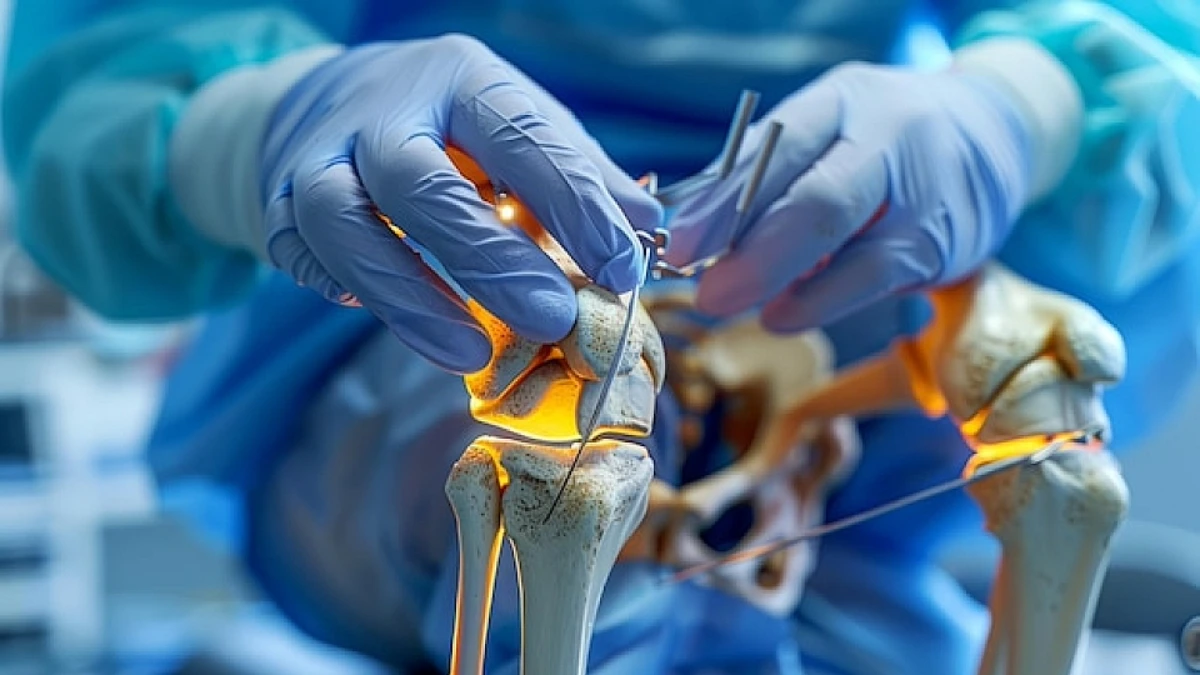Understanding ACL Reconstruction
Anterior Cruciate Ligament (ACL) reconstruction is one of the most common orthopedic procedures performed worldwide, especially among athletes and active individuals. The ACL is a crucial ligament that stabilizes the knee joint, and an injury can cause instability, pain, and significant limitations in daily life and sports activities.
ACL reconstruction involves replacing the torn ligament with a graft, usually taken from the patient’s hamstring or patellar tendon. The procedure restores knee stability, prevents further cartilage damage, and allows patients to return to their active lifestyle.
In Turkey, ACL reconstruction is performed using advanced techniques such as arthroscopic and minimally invasive surgery. Equipped with modern technology and experienced orthopedic surgeons, Turkish hospitals offer high success rates and fast recovery for both local and international patients. For more details about joint and ligament treatments, visit Orthopedics.
Why Choose Turkey for ACL Surgery?
Turkey has become a leading destination for patients seeking ACL reconstruction due to the combination of affordable healthcare, international expertise, and state-of-the-art facilities. Thousands of international patients travel each year for orthopedic procedures, including knee ligament reconstruction.
Key advantages of ACL surgery in Turkey:
- Affordable treatment costs compared to Europe and the US.
- Highly skilled orthopedic surgeons with international training.
- Modern hospitals accredited by international healthcare organizations.
- Comprehensive medical tourism services, including translation, transfer, and accommodation support.
To learn more about the advantages of medical treatment abroad, visit Why Turkey?.
What Is an ACL Tear and Its Symptoms?
An ACL tear is one of the most common knee injuries, particularly in athletes and individuals involved in high-impact activities. The anterior cruciate ligament is responsible for stabilizing the knee joint, and when it is torn, patients experience significant instability.
Common symptoms of an ACL tear include:
- A popping sound at the time of injury.
- Immediate pain and swelling in the knee.
- Difficulty bearing weight or walking.
- Instability or the knee “giving way” during movement.
If left untreated, an ACL tear can lead to chronic knee instability, cartilage damage, and a higher risk of developing osteoarthritis. For this reason, timely diagnosis and surgical intervention are crucial for long-term joint health.
Who Needs ACL Reconstruction?
Not all ACL tears require surgery, but ACL reconstruction is recommended for patients with significant knee instability or those who wish to return to physically demanding activities.
Candidates for ACL reconstruction include:
- Athletes involved in sports such as football, basketball, or skiing.
- Individuals experiencing recurrent knee instability after an ACL tear.
- Patients with combined injuries involving other knee ligaments or cartilage.
- Young and active patients who want to maintain their lifestyle.
In Turkey, orthopedic surgeons carefully evaluate each patient’s activity level, age, and goals before recommending surgery, ensuring a personalized treatment plan that maximizes recovery outcomes.
Surgical Techniques: Arthroscopic vs. Open Surgery
ACL reconstruction can be performed using different surgical techniques, with the two most common being arthroscopic surgery and open surgery. Arthroscopic ACL reconstruction is the modern gold standard in Turkey, offering patients minimally invasive care with faster recovery times.
Arthroscopic ACL Reconstruction in Turkey:
- Performed through small incisions using a camera and specialized instruments.
- Less pain and scarring compared to traditional open surgery.
- Faster recovery and return to sports.
- Lower risk of complications.
Open ACL Surgery:
- Requires a larger incision to directly access the knee joint.
- Used less frequently today, but may be considered in complex cases.
- Recovery time is generally longer than arthroscopic procedures.
In Turkey, most orthopedic surgeons use arthroscopic and minimally invasive techniques due to their proven effectiveness. For more details about combining surgery with international medical travel, visit Health Tourism.
Step-by-Step Procedure in Turkey
ACL reconstruction in Turkey follows a carefully planned process to ensure patient safety and optimal outcomes.
Typical steps include:
- Preoperative consultation and imaging (MRI scans, X-rays).
- Administration of general or regional anesthesia.
- Creation of a small graft from the patient’s hamstring or patellar tendon.
- Arthroscopic placement of the graft to replace the torn ACL.
- Fixation of the graft using screws or other devices to stabilize the joint.
- Closure of incisions and application of dressings.
The procedure usually takes 1–2 hours and patients are encouraged to start gentle rehabilitation within the first week. Hospitals in Turkey are equipped with advanced facilities to ensure high success rates and smooth patient experiences.
Recovery Timeline and Rehabilitation
Recovery after ACL reconstruction is a gradual process that requires patience, discipline, and professional guidance. In Turkey, patients benefit from comprehensive rehabilitation programs designed to restore full knee function and prevent reinjury.
Typical recovery stages include:
- Week 1–2: Pain and swelling management, gentle range-of-motion exercises.
- Week 3–6: Progressive strengthening of quadriceps and hamstrings.
- Month 3–6: Balance training, light jogging, and functional movements.
- Month 6–9: Return-to-sport training, advanced agility drills.
Most patients return to normal daily activities within 2–3 months, but a full return to competitive sports usually takes 6–9 months. Rehabilitation is key to long-term success, and close collaboration with physiotherapists ensures the best outcomes. For more information, visit Rehabilitation.
Risks and Possible Complications
Although ACL reconstruction is considered a safe procedure, there are potential risks and complications, as with any surgery. Turkish hospitals minimize these risks through advanced technology, sterile environments, and highly trained medical staff.
Possible complications include:
- Infection at the incision site.
- Blood clots or deep vein thrombosis (DVT).
- Knee stiffness or limited range of motion.
- Graft failure or re-rupture.
- Nerve or blood vessel injury (rare).
Patients are closely monitored during the early stages of recovery, and proper rehabilitation significantly reduces the likelihood of complications. By choosing an experienced orthopedic team, international patients can feel confident in both the safety and success of their surgery in Turkey.
Success Rates and Long-Term Results
ACL reconstruction in Turkey is associated with high success rates, thanks to advanced surgical techniques and experienced orthopedic teams. Studies show that more than 90% of patients regain knee stability and return to their previous activity levels after surgery.
Key long-term outcomes include:
- Restoration of knee stability for daily life and sports.
- Lower risk of developing arthritis when surgery is performed early.
- High patient satisfaction rates due to improved mobility and quality of life.
- Safe return to professional or recreational sports.
FAQ highlight: How successful is ACL reconstruction in Turkey? With modern arthroscopic techniques, success rates are comparable to leading European and American hospitals, making Turkey a trusted destination for international patients.
Cost of ACL Reconstruction in Turkey
One of the main reasons patients choose Turkey for ACL surgery is the affordability of treatment without compromising quality. The cost of ACL reconstruction in Turkey is significantly lower than in Western Europe or the US, while maintaining the highest medical standards.
What does the cost usually include?
- Preoperative consultations and imaging tests (MRI, X-rays).
- Surgical procedure with advanced equipment.
- Hospital stay and postoperative monitoring.
- Rehabilitation and physiotherapy programs.
- Assistance with travel, accommodation, and translation for international patients.
For further details about pricing and packages, visit Why Turkey?.
Best Orthopedic Surgeons & Hospitals in Turkey
The success of ACL reconstruction largely depends on the expertise of the orthopedic surgeon and the quality of the medical facility. Turkey is home to internationally accredited hospitals and highly trained specialists in sports medicine and knee ligament surgery.
Why choose leading orthopedic centers in Turkey?
- Board-certified surgeons with international experience.
- Hospitals equipped with state-of-the-art technology.
- Multidisciplinary teams including orthopedic surgeons, physiotherapists, and rehabilitation specialists.
- Patient-centered care tailored to individual needs.
To meet our specialists, visit the Doctors page.
Frequently Asked Questions (FAQ)
How long does ACL surgery take?
The procedure usually lasts 1–2 hours, depending on the complexity of the injury.
Can you walk after ACL surgery?
Yes, most patients can walk with crutches within a few days after surgery, but full weight-bearing takes longer.
How painful is ACL surgery?
Mild to moderate discomfort is common, but pain is managed effectively with medications and physiotherapy.
What is the recovery period?
Most patients return to daily activities within 2–3 months and to competitive sports in 6–9 months.
For more details or to book a consultation, visit the Contact page.
Start Your Recovery Journey in Turkey
ACL reconstruction in Turkey provides patients with world-class medical care, advanced techniques, and affordable costs. Choosing the right hospital and surgeon ensures high success rates and a safe return to active life.
At Avicenna International Hospital, we combine expertise, modern facilities, and personalized care to deliver the best outcomes for international patients.
Take the first step toward recovery today and contact our team through the Contact page to start your treatment journey.







